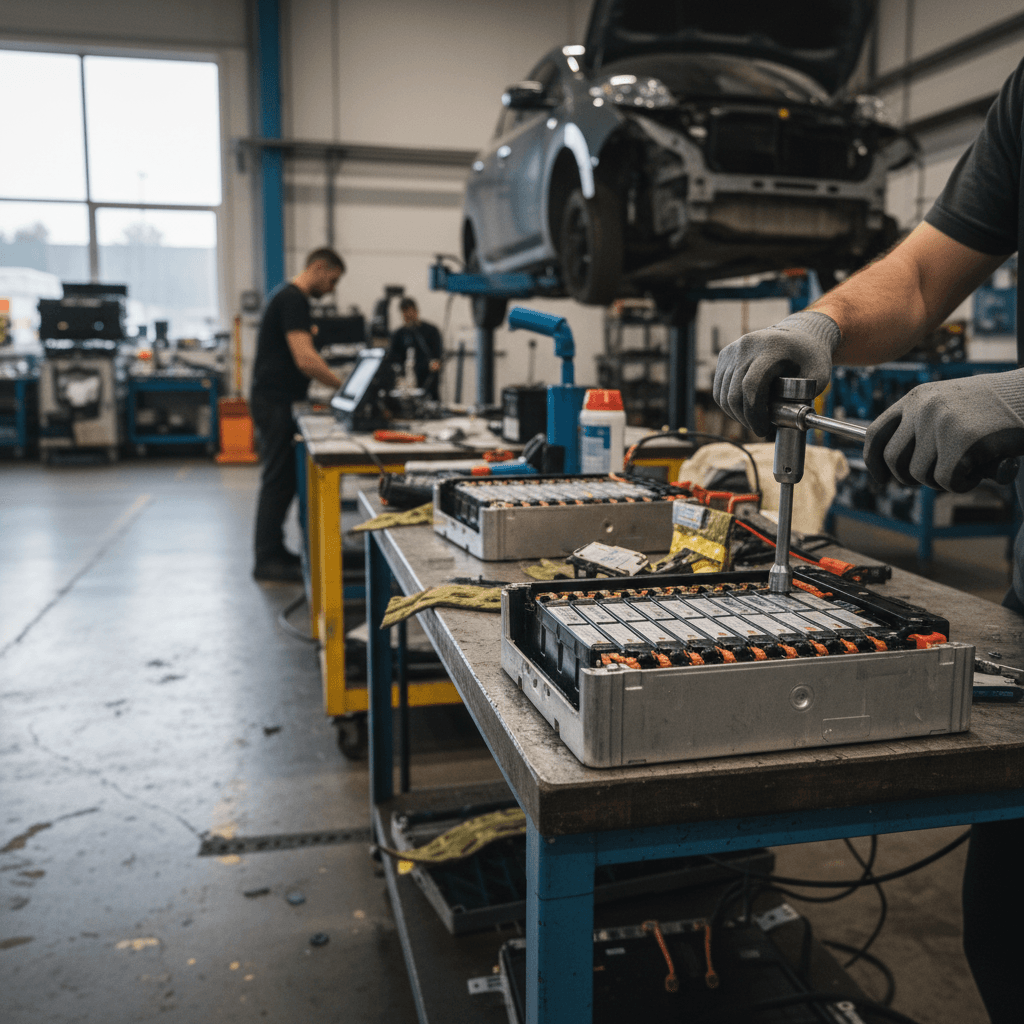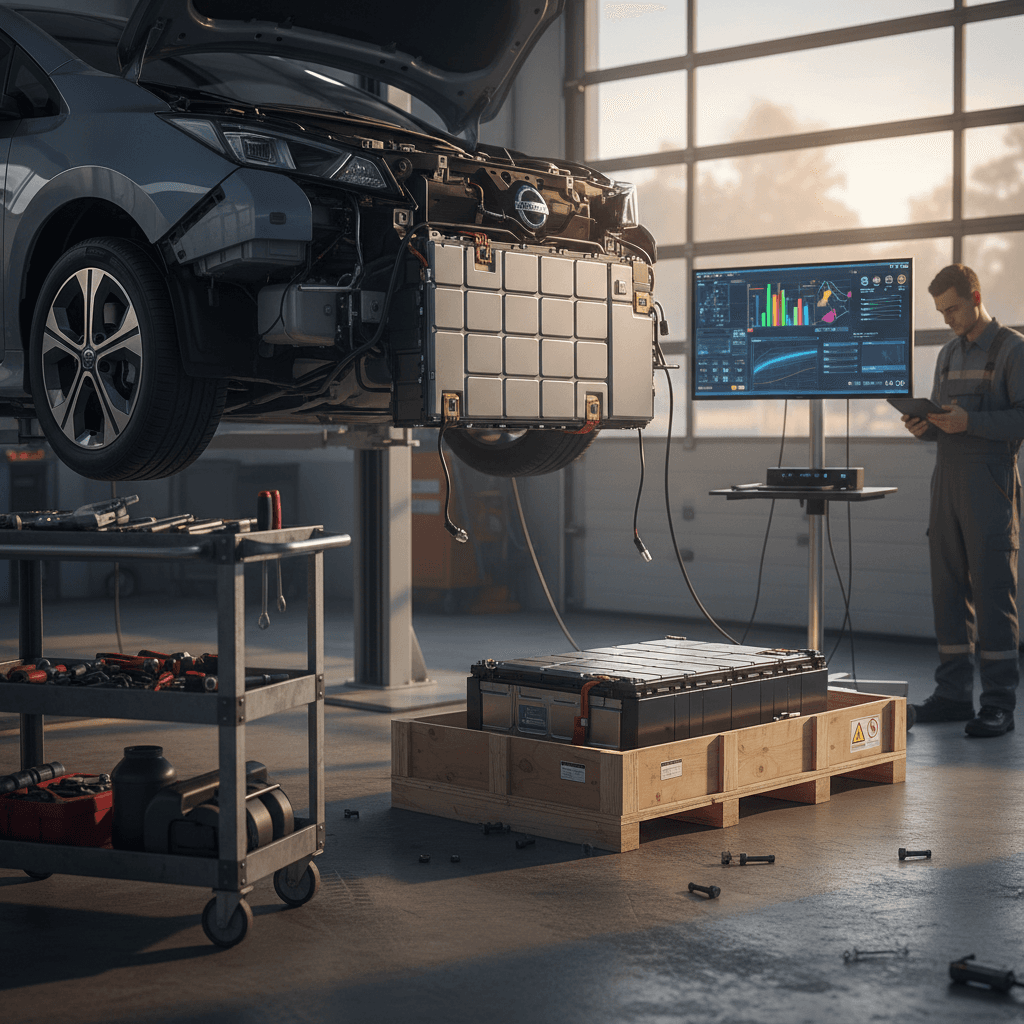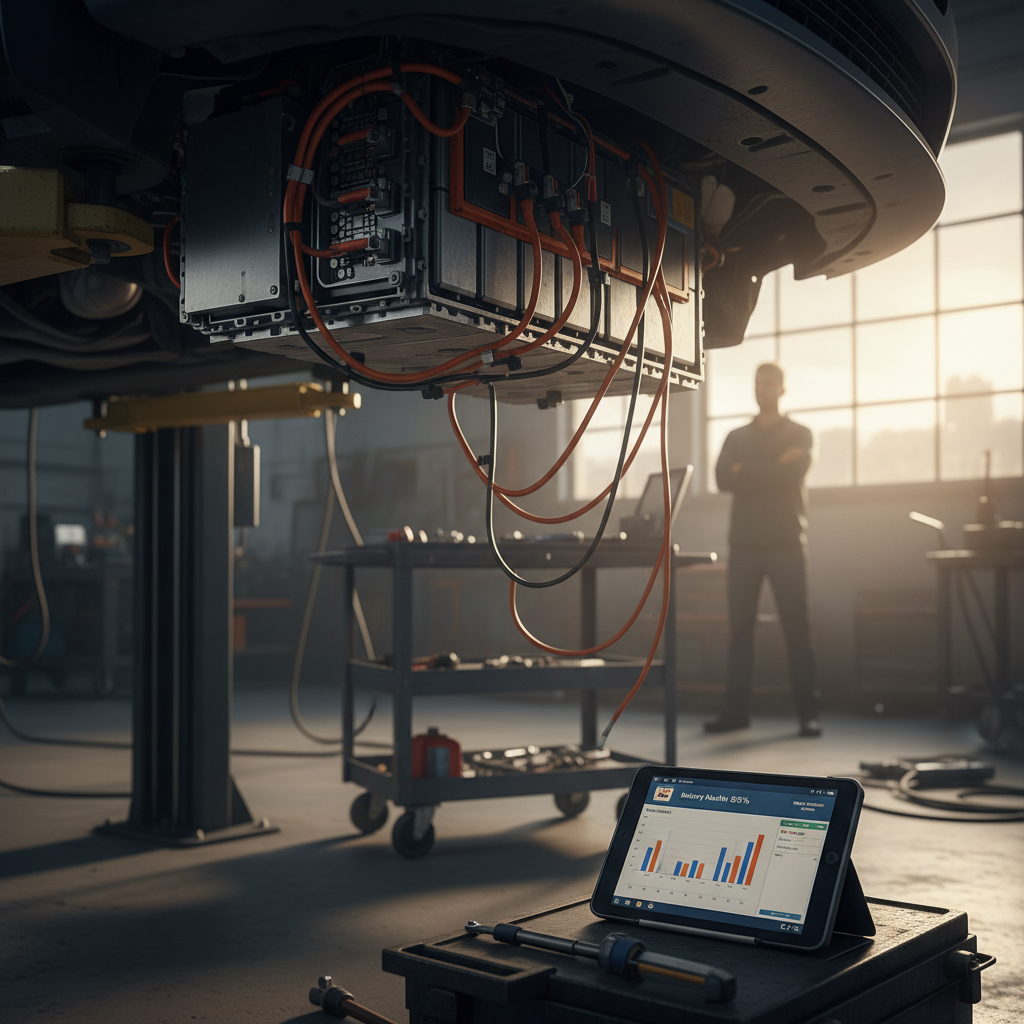If you own an older Nissan Leaf and the range is starting to fall off a cliff, you’re probably wondering about the Nissan Leaf cost of battery replacement, and whether it’s even worth doing on a car that might be worth less than the pack itself. In 2025, the answer is complicated: parts are scarce, prices are volatile, and the “right” move depends heavily on your Leaf’s age, battery size, and how you use the car.
Key takeaway on Leaf battery costs
Nissan Leaf battery replacement cost in 2025: the short answer
Typical Nissan Leaf battery replacement ranges (2025)
Different sources peg Leaf battery replacement anywhere from about $4,000 for an older, small-capacity used pack to well over $15,000 for a large, late-model pack with scarce supply. Some independent EV shops quote roughly $187–$270 per kWh when they can get inventory, while consumer-facing guides commonly cite $5,000–$12,000 for Leaf packs depending on size. In practice, what you pay depends on five things: pack size, new vs refurbished, supply in your region, whether Nissan is involved, and your local labor rate.
Sticker shock is normal
What actually drives the cost of a Leaf battery replacement?
Six big variables that set your Leaf’s battery price
Understanding these will help you decide whether to replace or move on.
1. Pack size & generation
2. New vs refurbished vs used
3. Supply & scarcity
4. Labor & shop type
5. Warranty & recall status
6. Region & incentives
Think in cost per extra year of life
Typical Nissan Leaf battery costs by pack size and model year
The Leaf has used several different battery sizes since 2011. Here’s how costs tend to shake out in late 2025. These are broad, real-world ranges from owner reports, EV-specialist shops, and industry guides, not guarantees for any given quote.
Estimated Nissan Leaf battery replacement costs by pack size (2025)
Approximate parts + labor totals in US dollars, assuming out-of-warranty replacement. Actual quotes will vary by region and supplier.
| Leaf model years (typical) | Pack size | Likely battery source | Estimated total (parts + labor) | Notes |
|---|---|---|---|---|
| 2011–2015 | 24 kWh | Used or refurbished | $4,500 – $10,000 | Prices vary widely; many packs come from salvage Leafs. New OEM 24 kWh packs, when available, are at the upper end. |
| 2016–2017 | 30 kWh | Used or refurbished | $5,000 – $10,000 | Less common pack; some guides peg replacements around $3,500–$4,500 for the battery alone when inventory exists. |
| 2018–2024 standard Leaf | 40 kWh | New, used, or refurbished | $8,000 – $13,000 | A popular upgrade size for early Leafs. Consumer cost guides often cite up to ~$12,000 for 40 kWh replacements. |
| 2019–2024 Leaf Plus | 62 kWh | Primarily OEM or late-model used | $10,000 – $16,000 | Large pack and limited supply drive prices higher; can easily exceed the vehicle’s market value on older Plus models. |
| Future 2026+ Leaf (75 kWh est.) | 75 kWh (projected) | OEM only, for now | TBD – likely $13,000+ | Third-gen Leaf with larger pack is just launching; replacement pricing isn’t yet widely published. Expect premium pricing at first. |
Smaller packs aren’t always cheaper, because older Leaf batteries are scarce and in high demand for replacements.
How Leaf costs compare with other EVs

Should you repair, replace, or sell your Leaf?
There’s no one-size answer to the Nissan Leaf cost of battery replacement. Instead, you’re making a value judgment: invest thousands into a car you already own, or put that money toward a different EV, possibly with more range, faster charging, or fresher tech. Here’s a practical way to think through the decision.
Decision checklist: what to do with a tired Leaf battery
1. Start with the car’s current market value
Look up what your Leaf would sell for today with a healthy battery versus its current degraded state. If a replacement battery quote is near or above that healthy value, replacement becomes hard to justify financially.
2. Check your actual range needs
If you drive 20–30 miles a day and still get that on a charge, you may not need a full replacement. For door-to-door commuting or a second car, even a degraded pack can work, especially in mild climates.
3. Get multiple battery quotes
Call at least a Nissan dealer and one independent EV shop. Ask for itemized quotes: pack cost, labor, and any extra hardware. You may find a refurbished option that’s thousands less than a new OEM pack, or you may learn that parts simply aren’t available locally.
4. Factor in time without the car
Some specialty shops have months-long wait lists for Leaf battery work, especially for upgrades. If your Leaf is a daily driver, the time cost may push you toward a different solution.
5. Consider selling or trading instead
Sometimes the economically rational move is to sell your Leaf as-is and put the battery money toward a newer EV with better range. A platform like <strong>Recharged</strong> can provide a transparent instant offer and help you avoid gambling on a pricey repair.
6. Run the “cost per year” math
If a $9,000 pack realistically buys you 7–8 more years of comfortable range, that’s roughly $1,100–$1,300 per year, before power, insurance, and maintenance. Compare that to the annual cost of buying or leasing a different EV.
When a Leaf battery replacement can make sense
- You own the car outright and it’s in excellent overall condition (no major rust, crash history, or drivetrain issues).
- You plan to keep it for at least 5–8 more years.
- You can secure a pack with a solid warranty (for example, a newer OEM or high-quality refurbished pack).
- Your usage is mostly local, so you don’t need DC fast charging or 300+ miles of range.
When replacement usually doesn’t pencil out
- The car’s private-party value is $8,000 and your quotes are coming back at $9,000–$12,000.
- You’re already eyeing something with more range, faster charging, or more space.
- You live in a hot climate and park outside, where future degradation will be relatively quick.
- You could instead trade into a newer used EV with a verified healthy pack.
How Recharged can help
Warranty, recalls, and when Nissan pays the bill
Before you assume you’re on the hook for the full Nissan Leaf cost of battery replacement, you should confirm whether your car is still covered by warranty or a recall. Nissan’s high-voltage battery warranty on US Leafs has typically been 8 years or 100,000 miles for capacity loss below a certain threshold (often defined as dropping below 9 bars on the dashboard gauge), though the exact terms vary by model year and region.
- If your Leaf is within the original 8-year/100,000-mile high-voltage battery warranty and shows excessive degradation, you may qualify for a warranty replacement at little or no cost.
- Some recent Leafs have been affected by recalls or software updates related to fast charging and battery safety. If your VIN is covered, Nissan will typically perform the repair or update at no charge.
- Standard 3-year/36,000-mile bumper-to-bumper warranties generally do not cover long-term capacity loss; that’s handled under the separate EV battery warranty.
Don’t ignore recall or safety notices
How to get real-world quotes for your Leaf’s battery
Online averages are useful, but the only number that really matters is the quote in front of you. Here’s how to get realistic, apples-to-apples pricing on a Leaf battery replacement in your area.
Step-by-step playbook for gathering Leaf battery quotes
1. Document your Leaf’s details
Write down your VIN, model year, pack size (24/30/40/62 kWh), current mileage, and the number of capacity bars on the dash. Shops will ask for this immediately.
2. Start with a Nissan dealer
Call or email the service department and ask specifically for a <strong>high-voltage traction battery replacement quote</strong>. Request a breakdown of parts and labor, and ask whether the work would be warranty-eligible based on your VIN.
3. Contact an independent EV specialist
Look for shops that regularly service EVs or specifically mention Leaf battery upgrades. They may have access to refurbished or salvage packs, or offer upgrades to a larger pack size for older Leafs.
4. Ask about pack source and warranty
For each quote, ask whether the pack is new, used, or refurbished; who supplies it; and how long it’s warranted. A cheaper pack with a 90‑day warranty may be riskier than a slightly more expensive pack with multi‑year coverage.
5. Clarify upgrade vs like-for-like
If you own an early 24 kWh Leaf, some specialists can retrofit a 40 kWh pack. This adds range but may increase labor and parts cost. Decide up front whether you’re open to an upgrade or only considering a direct replacement.
6. Compare to the cost of switching cars
Take your best quote and compare it to the cost of moving into a newer EV. Get an instant offer for your current Leaf and look at used EV listings with verified battery health, <strong>Recharged</strong> can streamline this with battery diagnostics and financing under one roof.
How Recharged handles battery health on used Leafs
If you’re shopping for a used Leaf, or thinking about selling yours, battery uncertainty is the biggest friction point. That’s exactly what Recharged was built to solve. Instead of guesswork based on age and mileage, every EV we list comes with a Recharged Score Report that includes verified battery state-of-health and fair market pricing.
Why battery health matters more than brochure range
What you see on a spec sheet rarely matches a decade of real-world use.
Real range, not brochure estimates
Transparent, comparable scores
Aligned pricing & financing
Thinking about trading out of your Leaf?
Nissan Leaf battery replacement FAQ
Frequently asked questions about Leaf battery replacement
Bottom line: is a Leaf battery replacement worth it?
The Nissan Leaf helped kick-start the modern EV market, but its battery pack is both its greatest strength and its biggest long-term wildcard. In 2025, the cost of Nissan Leaf battery replacement often lands in the same ballpark as the car’s resale value, especially for older models. That makes every decision highly case-by-case.
If your Leaf is otherwise clean, you plan to keep it for years, and you can secure a high-quality pack with a solid warranty at a reasonable price, replacement can extend the life of a car you already know and like. If not, the smarter move is usually to step back, get a clear picture of your Leaf’s current battery health and market value, and compare that against the cost of moving into a newer EV.
Either way, don’t make the decision in the dark. Use real quotes, realistic range needs, and transparent battery data. And if you decide to change vehicles, Recharged is built to make the used EV side of that equation more straightforward, with verified battery diagnostics, fair pricing, financing, trade-in options, and expert support from start to finish.

